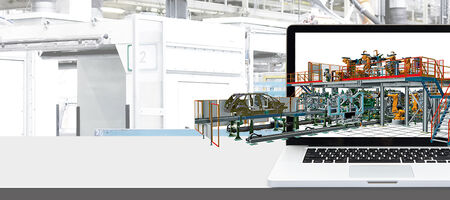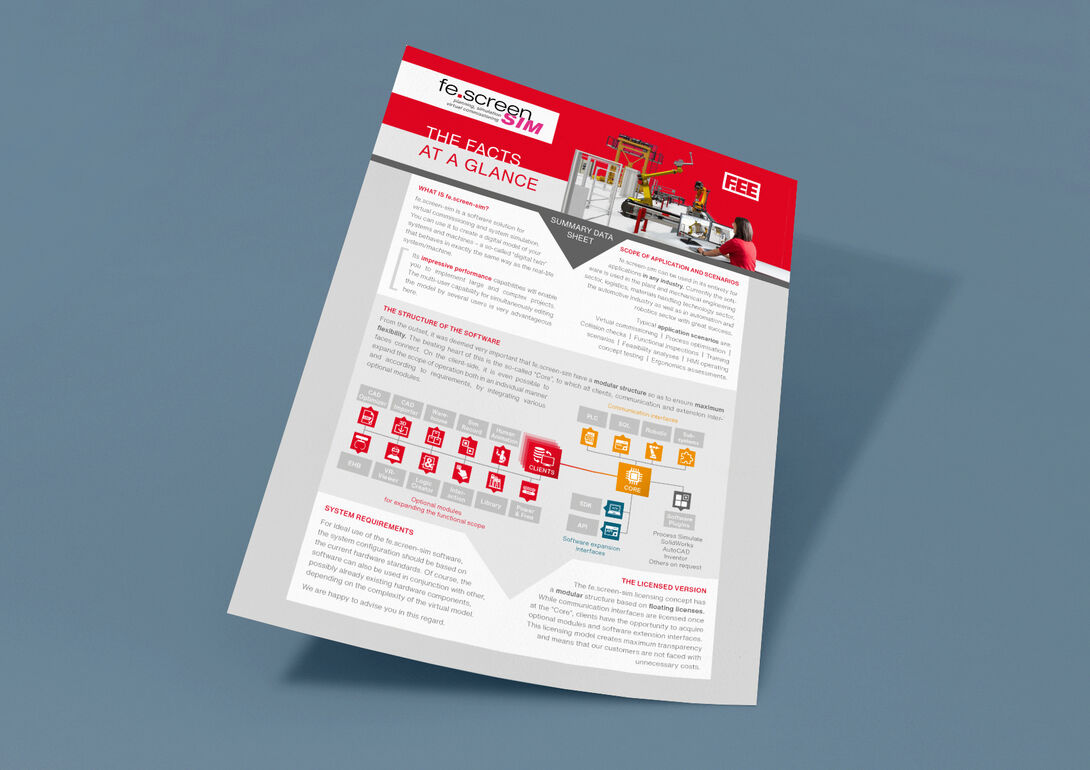Virtual commissioning: For more planning and efficiency
A virtual commissioning of complex plants and machines saves a lot of time and costs. This requires the right software with the right functions and interfaces. This is where our tool fe.screen-sim comes in.
As a long-standing plant engineering company, we have developed a simulation software that is modular and meets extensive requirements. With a strong performance. Across all industries. The result: virtualisation at the push of a button.
Content: What you will find on this page
- Our software for virtual commissioning: Features at a glance
- Comparison: traditional and virtual commissioning
- Provider selection: That speaks for F.EE
- Case studies: Examples from various industries
- FAQs about virtual commissioning
- Personal call: Check requirements and time schedule
- Definition of virtual commissioning and digital twin
- Consulting, training and project support
Our software for virtual commissioning: Features at a glance
- Multi-user capability: Several users work together on a simulation project.
- Integrated user and group administration.
- Extensive element catalogue for building your own models and library objects.
- Creation of logic in FBD and C#.
- Graphic Assign: Simple, automated assignment of connections, e.g. between variable and simulation element.
- Innovative editors for easy and subsequent editing of material, model and physics.
- MeshEditor for targeted definition of collision areas.
- Automated signal assignment of I/Os from the PLC.
- Integrated signal recorder.
- Bidirectional exchange between CAD and simulation.
- Available programming interface API and Software Development Kit (SDK) for own implementation of functionalities and interfaces.
- Integrated physical calculation of friction, speed etc.
- Coupling of different communication partners in a simulation project (e.g. controllers and robots).
- Full test license for evaluation purposes.
- Extensive range of services offered by F.EE: e.g. creation of behavioral models and development of customer-specific modules and additional functions.
Conventional commissioning
Conventional commissioning can be very costly and time-consuming. Especially when things do not run as planned. Errors in the software are often only discovered in the very late phase of commissioning. Troubleshooting then costs considerably more time, which, moreover, has not been taken into account in advance. The project comes to a standstill, which causes additional personnel costs.
Virtual commissioning
By modeling in the early design phase, PLC programmers secure their control code. The data can be conveniently entered via editor or imported from CAD programs. In this way, the plant or machine can be quickly modeled and tested in real time. The subsequent commissioning time is reduced by 15 to 30 percent. Customer satisfaction is correspondingly high.
This is why customers choose our tool for virtual commissioning

Developed from practical experience
F.EE is not a pure software manufacturer, but a plant manufacturer and engineering partner. Our solution is the result of practical requirements. For more than 30 years we have been supporting companies from the automotive industry, mechanical and plant engineering and other industries. We know what a software for a simulation model must be able to do – and we use our solution ourselves.
Modular adaptation
Our software has a modular structure and can be expanded flexibly, depending on the requirements and application area. The architecture consists of a core-client model, is multi-user capable and industry independent. Our software is suitable both for the virtual commissioning of smaller projects and for the simulated control of complex plants with up to 100,000 individual parts.
Flexible price
Like the control software, the costs are also modular. The price depends on the modules and the number of users. So you only pay for what you need. You receive an unlimited usage model and can continue to use your digital twin after commissioning, for example for optimisation measures on the design or training courses without shutting down the plant.
Satisfied customers prove us right

"The simulation is so easy to create that you don't even need a help file - a really good usability. The simulation team is very helpful and willing to make any useful adjustments in the software. The features that had to be specially created for us were specified in a very tight time frame and developed on schedule. A simply beautiful and effective cooperation."
Michael Bock, System Logistics GmbH, a subsidiary of Krones AG
Virtual commissioning in practice: examples from four sectors
Simulation in automotive engineering
In the automotive and supplier industry, those responsible have an ever shorter time window for plant development. Simulation allows complex and time-critical projects to be successfully implemented.
Virtualization of a warehouse
In logistics, increasingly complex warehouse systems are required. Storage, removal and transfer processes must be planned. Through early virtualisation, all processes can be simulated clearly and in real time.
Modelling of a robot
Robots can also be integrated quickly and easily using the existing interfaces. Connections are established to tools from the robot manufacturers, for example Kuka (Kuka Office Lite) or ABB (ABB Studio). The data of the emulated robots are read, used in the simulation and sent back.
Simulation models in mechanical engineering
3D simulations are also successfully used in mechanical engineering. With fe.screen.sim you can simulate machines with any number of axes. Also the machine operator can be trained more easily by a digital twin. For example through the use of AR-glasses.
FURTHER APPLICATION AREAS AND QUESTIONS ABOUT VIRTUAL COMMISSIONING
What are the application areas and scenarios?
The use of fe.screen-sim is completely possible regardless of the industry. Currently, the software is already being used very successfully in plant and mechanical engineering, logistics, materials handling, automation and robotics.
Typical application scenarios are:
- Virtuelle Inbetriebnahme
- Process optimization
- Collision checks
- Functional tests
- Training scenarios
- Feasibility studies
- HMI operating concept tests
- Ergonomics considerations
In which business areas can the simulation be used?
Flexibility is a keyword that has always played a major role in the development of fe.screen-sim. Through a cross-departmental use of the 3D simulation software in the company, synergy effects can be used optimally and potential can be exploited in the best possible way.
On the one hand, simulation models can be created directly in fe.screen-sim without using an existing database. On the other hand, the import of data from CAD programs is possible, whereby many file formats (e.g. FBX, OBJ, WRL, JT, etc.) are supported.
In addition, programmable logic controllers (PLC) from a wide range of manufacturers (e.g. Allen Bradley, Rockwell, Schneider Electric, Siemens) can be integrated into fe.screen-sim.
Of course, the simulation of robots from various manufacturers - including ABB, Fanuc and KUKA - is also possible. An SQL database interface ensures the smooth integration of fe.screen-sim into the workflow.
What are the benefits of virtual and augmented reality in plant simulation?
The integration of an interface for different VR and AR glasses allows the user to immerse himself in the simulation. This makes it easier to estimate sizes and distances. New, impressive display possibilities open up. Sign in for one of our next webinars! There you will learn more about it.
Who creates such a model in our company?
The field of virtual commissioning is new to engineering science. Therefore, many companies do not have trained personnel with specific responsibilities in this field. Ideally, the responsible employee should be a "virtual mechanic" who understands how the plant works and at the same time has a basic understanding of PLC.
How quickly can a model be created?
This depends on the degree of idealization and the complexity of the plant or machine. Quickly checking a linked system for feasibility works in a few minutes. Several days must be invested in a detailed representation. This also depends on the database you can provide us with. This can best be clarified in a personal conversation.

CLARIFY REQUIREMENTS AND TIMEFRAME FOR VIRTUAL COMMISSIONING
Are you a project or department manager and want to tackle virtual commissioning? Do you already compare different tools? In a personal conversation we can clarify your requirements and the time frame. We can also give you an initial cost estimate.
Definition of virtual commissioning and digital twin
Definition Digital Twin
A Digital Twin is a virtual model that digitally represents the properties and behavior of the object or process. Digital twins are used in numerous fields of application. It is therefore a generic term. The field of application of the Digital Twin in production and mechanical engineering is called virtual commissioning.
Definition of Virtual Commissioning
Virtual commissioning is the process of creating a virtual model of a machine, plant or robot. Planning data can be imported and tested there before the machine is later developed in real life. Studies such as those conducted by the VDMA have shown that VIBN can demonstrably save additional work and costs because errors are already detected in the early stages.
Our services: Consulting, training and support
For your first project where you use virtual commissioning, everything is new. We won't leave you alone and explain how a typical startup phase with fe.screen-sim, including workshops, training and support during project implementation, can be handled. Learn more about our services.









